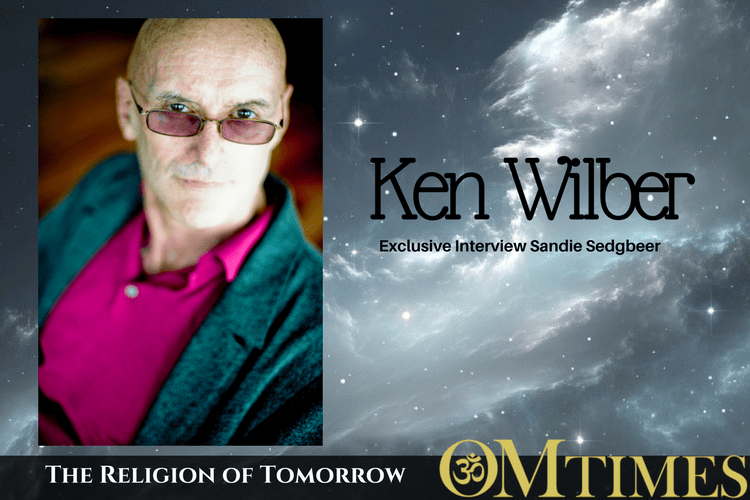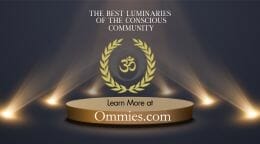Ken Wilber: The Religion of Tomorrow

Ken Wilber is one of the more widely read and influential American philosophers of our time. He is a proponent of transpersonal psychology and is the creator of Integral Theory, a four-quadrant grid which suggests the synthesis of all human knowledge and experience. A prolific author, Ken Wilber joins us to discuss one of his latest works, The Religion of Tomorrow.
Radio Interview of Ken Wilber
To listen to the complete interview of Ken Wilber by Sandie Sedgbeer on her show What Is Going OM on OMTimes Radio, click the player below.
An Interview with Ken Wilber: The Religion of Tomorrow
In Ken Wilber’s latest book, The Religion of Tomorrow: A Vision for the Future of the Great Traditions, the author, leader, scholar and founder of the Integral Institute Ken Wilber notes that there is a sensual paradox in the role of religion throughout history. On the one hand, religion has been the single greatest cause of war and suffering. On the other, it’s been the single greatest source of redemption, salvation, and liberation for humanity.
Ken Wilber asks how could we possibly make sense of this apparently impossible contradiction. How can we reconcile the very best qualities of religion with the very worst?
Ken Wilber joins us today to explain how part of the problem is that the path of waking up needs to be complemented by the path of growing up, to renew and replenish our understanding of enlightenment in the 21st Century.
Sandie Sedgbeer: Ken Wilber, in The Religion of Tomorrow, you say that a single purpose lies at the heart of all the great religious traditions, which is awakening to the astonishing reality of the true nature of ourselves and the universe. If that is so, how is it that religion and spirituality have come to be the greatest cause of war and suffering as well as the greatest source of redemption, salvation, and liberation? What happened to erode that focus?
Ken Wilber: Well, that’s probably one of the most central questions that we can ask about religion itself. And strangely, we’ve only really gotten some satisfactory answers to this question in the last decade or two. And one of the ways that we can approach this is indeed by what you mentioned, which is by recognizing that there are at least two very important dimensions to religion in general. They’re both equally important, but they’re quite different. And one is what we indeed call waking up, and one is what we call growing up.
So, waking up is, in a certain sense, it’s kind of the essential core of what the world’s great spiritual traditions are meant to do. So, most of the great traditions maintain that the typical human being is living in a world that in some sense is less than adequate. It’s referred to as a fallen world, or for Buddhists and Hindus, it’s a dualistic world, a world of fragmentation and even illusion, it’s a world of alienation, for certain Christians, it’s a world of original sin. Any way we look at it, it’s an existentially problematic almost inferior kind of world that we typically live in.
But, all of the great traditions maintain that there is a certain pathway. A certain set of exercises, either some form of yoga or meditation or contemplation or centering prayer that we can do and that will help us discover an infinitely much more wonderful world, in a sense, a world that’s saved, a world that’s redeemed, a world that is non-dual, a world that’s awakened, enlightened. The New Testament calls it metamorphosis. It’s well known in Buddhism as enlightenment, awakening.
And most of the great traditions tell some version of that story. And so, that whole process is what we refer to as waking up. And if you look at the world’s great traditions, the great contemplative core of most of the world’s great spiritual traditions, you can find certain very broad similarities in how they look at waking up, how they view enlightenment and realization. And essentially, it’s moving from a fragmented, divided, isolated suffering self, which is often not entirely correctly, but it’s often just referred to as the ego or the separate self-sense.
And it’s moving from that state to a state that’s often-called divide unity or oneness or wholeness. It’s realized in ultimate unity consciousness, a satori or absolute oneness with the entire ground of all being.
It sounds rather grandiose because, in a certain sense, it is. It’s literally discovering your fundamental identity on the ground of all being. And that realization is said to lead from a fallen world to a redeemed world, from a fragmented world to a whole world. And this is maintained to also bring relief from suffering and alienation and torment that the typical ego suffers constantly.
And so, this is the real core of most of the world’s great religious and great spiritual traditions.
As St. Paul put it, “Let this consciousness be in you which was in Christ Jesus that we all may be one.” And it’s that unity consciousness, that oneness, that waking up to a unified reality that most of the great traditions author as their answer to the suffering, duality, sin, and separation that most typical human beings suffer from the moment they’re born.
Now, this kind of realization goes back at least several thousand years, and we can certainly see, if we go back to the earliest Shamanic voyages, it can go back 30 or 40,000 years. It’s certainly a realization that has been with humanity for most of its historical development.
So, when and you look at that state of awakened unified awareness, in most traditions, it is indeed defined as also having a sort of profound infinite love. For the Christian tradition, of course, God is love. For the Buddhist tradition, it’s compassion.
As we awaken to our ultimate unity condition, as we awaken to this unified ground of all being, we also awaken to a profound love, a profound compassion, a deep care and concern for all human beings, indeed all sentient beings, particularly because all of them, unless they’ve also awakened or become enlightened in their own case, all of them are suffering, all of them are hurting, all of them are in a great deal of pain.
And so, once we awaken and discover this genuine reality and this genuine ground of being, then we feel a natural love and care and compassion and concern for all beings, and we want to help them awaken, as well.
Sandie Sedgbeer: How do we encourage that when, according to experts, 70 percent of the world’s population is at a fundamentalist state of development, where their given religion is taken to be the literal word of God.
Ken Wilber: Well, that’s where the other part of the story comes in. And so, just laying out the idea that there is this waking up, and there is, but that’s only half the story because we also have the growing up component. And this is where it gets really problematic. This is actually what explains how religion can go from offering, on the one hand, the sort of greatest source of love and compassion of anything, but it can also be the source of arguably the greatest amount of suffering, torture, murder, and warfare in humankind’s history. I mean, how are both of those possible?
And the answer is that largely depends on the degree of growing up that individuals have. So, even if they have a waking up experience, their growing up component will determine how they interpret it, how they understand it. And this is something that–strangely, this component was only discovered about 100 years ago.
So, there’s no religion anywhere in the world that includes this growing up component. So, let me briefly explain what that component is, and I think you’ll start to see why it’s so important regarding our spiritual understanding and how we interpret our waking up experiences.
This has to do with the fact that human beings have upwards of a dozen or so what are called multiple intelligences. And so, we have not only a cognitive intelligence, we have emotional intelligence, we have aesthetic intelligence, we have inter-personal intelligence, we have moral intelligence, and we also have something called spiritual intelligence. And spiritual intelligence is different from waking up because spiritual intelligence is part of growing up.
A veteran broadcaster, author, and media consultant, Sandie Sedgbeer brings her incisive interviewing style to a brand new series of radio programs, What Is Going OM on OMTimes Radio, showcasing the world’s leading thinkers, scientists, authors, educators and parenting experts whose ideas are at the cutting edge. A professional journalist who cut her teeth in the ultra-competitive world of British newspapers and magazines, Sandie has interviewed a wide range of personalities from authors, scientists, celebrities, spiritual teachers, and politicians.









